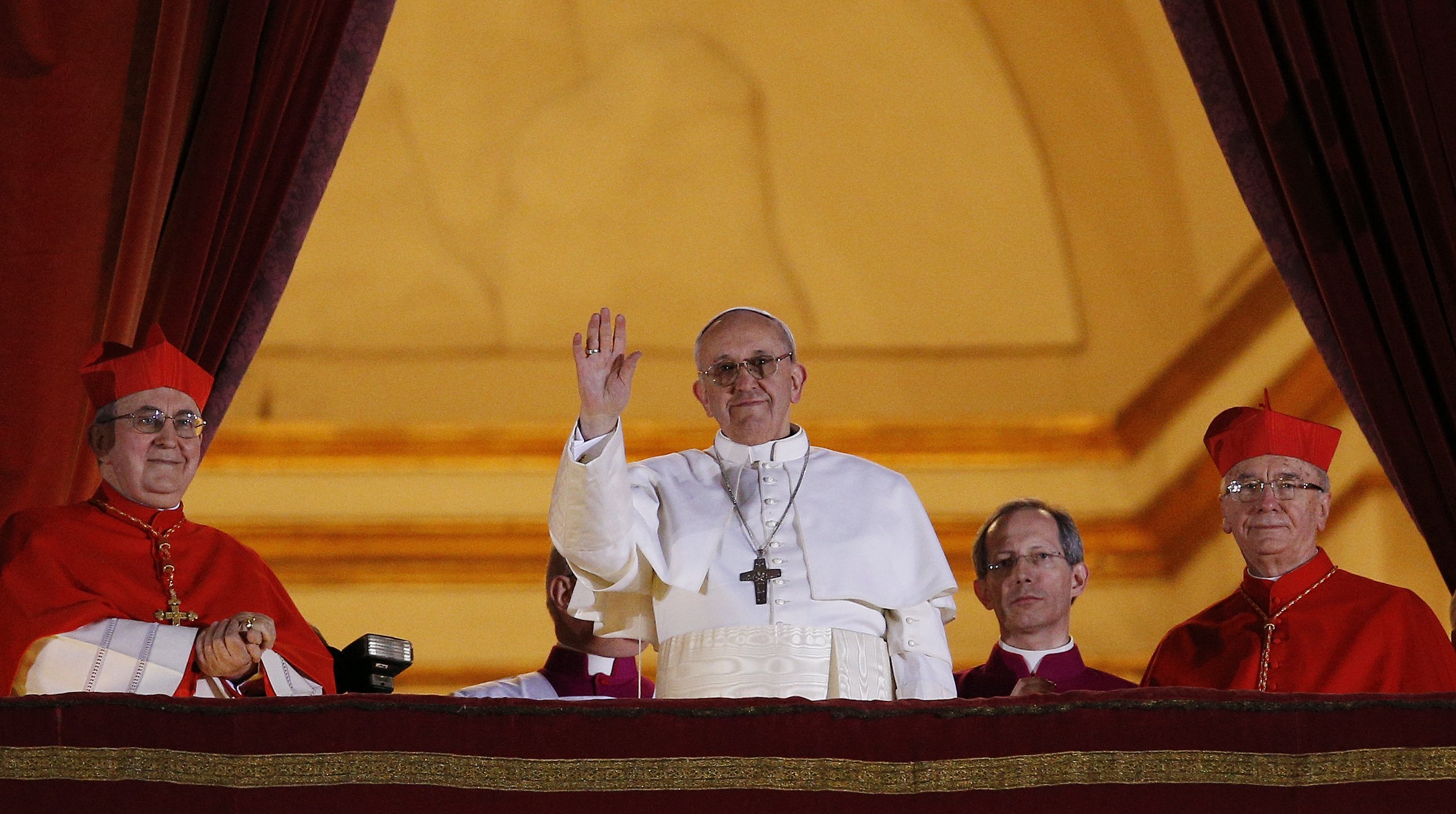The passing of Pope Francis (1936–2025) marks the end of a historic and deeply pastoral pontificate — one defined by humility, mercy, and a relentless call to bring Christ to the margins of society.
Elected on March 13, 2013, as the first Jesuit pope, the first pope from the Americas, and the first to take the name Francis, Cardinal Jorge Mario Bergoglio quickly made clear that his papacy would be centered on compassion, simplicity, and service. His vision for the Church was rooted in the Gospel and guided by his profound love for the poor, the suffering, and the forgotten. His papacy, which spanned over 12 years, bore witness to a shepherd’s heart — one who, in his own words, called priests and bishops to “smell like the sheep.”
For the Saint John’s Seminary community, Pope Francis’ life and witness have left an indelible mark. Those among our seminarians, faculty, and staff who had the blessing of meeting Pope Francis in-person experienced his warmth, wisdom, and Christ-like love. He touched them deeply, inspiring their vocations and strengthening their resolve to serve the Church with humility and joy.
Yet, even amid our grief, we are filled with great hope — hope in the mercy of God for the repose of Pope Francis’ soul, and hope that the Holy Spirit will guide the College of Cardinals in electing a new pope. In this pivotal moment for the Church — when strong, authentic, and joyful Catholic leadership is needed more than ever — we trust in God’s providence to raise up a shepherd who will lead with faith, courage, and compassion.
Among those who have shared their reflections is Msgr. Stephen E. Salocks '80, Rector of Saint John’s Seminary, who recalls with vivid clarity the rainy evening of Pope Francis’ election:
“It was not a nice evening in the square; it had been raining all day... But when Pope Francis came out, incredibly, it stopped raining. He greeted us and asked us to pray with him, and from the front of Saint Peter’s Basilica all the way down to the Tiber River, the entire crowd fell silent in prayer. It was a moment of grace — a glimpse of the unity and holiness that Pope Francis would continue to embody.”
Msgr. Salocks also reflected on the Pope’s pastoral spirit, especially at his first Chrism Mass, where he encouraged priests to “smell like the sheep” — a phrase that would go on to define much of Francis’ ministry.

Fr. Joseph Briody, faculty member, highlighted the spiritual clarity Pope Francis brought to the priesthood and the mission of the Church:
“He reminded us that the Christian life comprises two key elements: adoration and service. The priest is a contemplative in action. Pope Francis often pointed out that priests are not social workers, but shepherds after the heart of Christ.”
For Fr. Michael MacInnis, a faculty member and Coordinator of the Propaedeutic Formation Program, the Pope’s legacy is most powerfully felt in how he has shaped the Church’s approach to mercy and priestly formation:
“For me, the heart of Pope Francis’ pontificate is the tangible demonstration of God's mercy. Through his actions of compassion, his simple way of living, and his teachings, the Holy Father has shown that God’s mercy is available to everyone... His example has inspired me to become a better priest and a more compassionate human being. It has also deeply influenced my work in priestly formation.”

Fr. MacInnis noted how the Seminary’s formation program has embraced the Pope’s model by placing seminarians in ministries that emphasize compassionate accompaniment with the poor, homeless, elderly, and marginalized — echoing the Holy Father’s call to build a “poor Church for the poor.”
Ellen T. Oesterle, M.A.M. ’09 offered a moving personal account of witnessing Pope Francis during his 2015 visit to Washington, D.C.:
“The most remarkable reality was the deep silence that could be heard as Pope Francis spoke. The revival was mysterious — like a yearning for the peace the world cannot give. For a time, Pope Francis reminded all present that heaven’s reach begins with the ‘apostolate of the ear’ — caring for those encountered.”
From papal documents like Evangelii Gaudium and Laudato Si’ to his recent encyclicals Desiderio desideravi (2022) and Dilexit nos (2024), Pope Francis offered the Church a deep well of spiritual, liturgical, and pastoral insight. He urged Catholics to encounter Christ in the Eucharist and in the faces of the poor. He challenged the faithful not to cling to comfort but to reach out, again and again, in mercy.
His legacy at Saint John’s Seminary will continue in the formation of priests who lead with hearts formed by compassion, courage, and a deep love for Christ and His Church.
“Through Pope Francis’ leadership, I pray that all of us have come to ‘smell more like our sheep’ and have grown in our capacity to love.”
— Rev. Michael MacInnis
May Pope Francis rest in peace, and may the Holy Spirit guide the Church as we await the next successor of Saint Peter.


